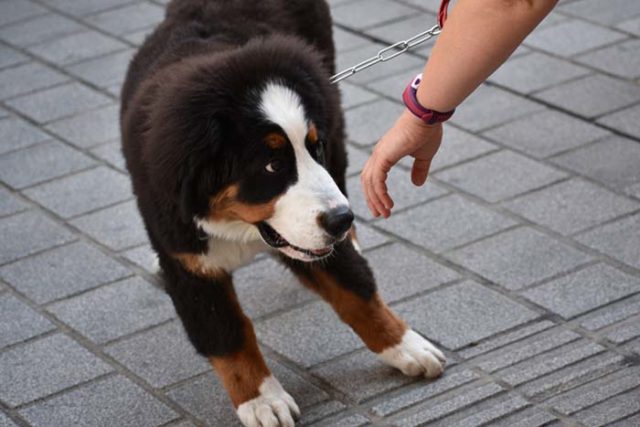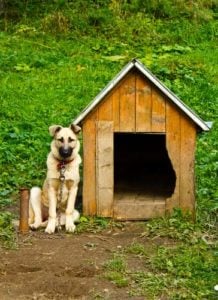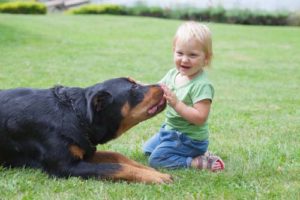
One of the great things about being a pet owner is knowing that there are other like-minded people out there who share the same passion and adoration for their dogs as you have for yours.
The trouble is that caring for a pet is a lot like caring for a child; everyone has their own way, and not all of us agree on what’s best.
The difference is, children don’t have sharp nails and teeth that could severely injure someone or their dog if bad behaviors aren’t corrected.
Sometimes pet owners even encourage bad behavior without realizing it.
If there’s ever been a time when you wanted to “give advice” to another dog owner, but you didn’t want to create conflict, you aren’t the only one.
ALSO READ: 25 Ways to Be a Responsible Dog Owner
Indoor and Outdoor Dogs, Should You Say Something?
 Among the pet community, there is some disagreement as to whether or not it's alright to keep dogs outside for extended periods.
Among the pet community, there is some disagreement as to whether or not it's alright to keep dogs outside for extended periods.
For example, hotter states like Texas and Arizona can reach temperatures of over 100 degrees.
Colder states like Minnesota can have freezing weather in winter.
No matter how much your dog likes the outdoors, it's just not safe or kind to leave them outside in that kind of heat or cold.
On the other hand, breeds like Labradors and Australian Cattle Dogs are generally the happiest being outdoors; as long as weather permits, they’re satisfied spending a few hours sniffing and romping in the grass.
So if you have a neighbor or family member who leaves their dog outside for extended periods and you’re concerned, take a moment to consider the situation and your approach.
Instead of saying “you shouldn’t leave your dog outside for so long” redirect the conversation to recent events in the news.
For example, it's not rare for random strangers to drop balls and toys into backyards and boarding kennel play areas that contain rat poison and other types of fatal chemicals.
Try something along the lines of “Did you hear about this? Someone has been putting poison inside tennis balls and throwing them over fences!”
It sparks up a natural conversation, and puts it in their mind to maybe bring Fido inside a little more often.
Even if they are comfortable outside, this is a valid reason to be concerned.
Canine Socialization and Introduction
 There’s nothing that makes you cringe more than when you’re able to detect something amiss in a dog’s posture and body language while the other person can’t.
There’s nothing that makes you cringe more than when you’re able to detect something amiss in a dog’s posture and body language while the other person can’t.
We all know our pets best, and we’re aware of their quirks and habits.
However, it's also important to recognize the behavior of other animals; not all dogs are as friendly as yours may be, and if your pup approaches another canine who is fearful, it could easily start a fight.
Some owners don’t recognize this though, and still approach strange dogs they don’t know.
For starters, if your pet simply doesn’t like other animals, it can be stressful, and it's understandable to want to snap and tell the other person to get away.
However, the other person may take offense, and the situation could escalate.
Instead, try to offer up visual cues that warn them from afar.
You can easily find a vest, leash, or harness that advises people to practice caution and keep their distance.
If someone insists or a child wants to pet, simply let them know in a polite but firm way that “he doesn’t like strangers, please stay a few feet away.”
While this can be somewhat of an uncomfortable situation, you have to protect your pup and become the mediator when their safety is threatened.
Should they nip a child who still reached out to pet them, your dog could be deemed “aggressive,” and we all know what happens afterward.
Dogs with Guests in the Home
 When you’ve got a dog at home, and you want to have people over, it can be tough to decide if they should be allowed to partake in the festivities as well.
When you’ve got a dog at home, and you want to have people over, it can be tough to decide if they should be allowed to partake in the festivities as well.
This is especially tricky when you have guests over who feel like they know more about your pet’s behavior than you do.
One major problem pet owners run into are guests (who also happen to be dog owners) who are a little overzealous with playtime.
They get the dog all riled up, and at the height of the excitement, your guest heading home to get a good night’s rest before work.
Meanwhile, you’re stuck with a pup who is over the moon with energy and won’t settle down.
It's not that the other person wanted to make your life difficult; this is likely how they handle their own dog at home.
In situations like these, all you need to do is set the rules upfront; this doesn’t mean you say, “we don’t do things that way at my house.”
Instead, send a group text or email friends ahead of time and let them know that your pup may be present during your get-together.
Explain that you want them to learn how to socialize appropriately with others; this is a chance to teach them to stay calm when guests are over.
Sometimes excitement in a social setting is unavoidable, and at some point you may have to keep your pooch in a secluded area.
It's probably better that they take a time-out anyway and get away from all the people laughing, yelling, and playing games.
A friendly reminder ahead of time sent to everyone, though, sets the tone before the occasion begins and doesn’t put you in an awkward position where you have to let Fred know that you don’t want his bad behavior reinforcement rubbing off on your dog.
No one wants to be the bad guy in any situation, especially when it comes to owning a pet.
Safety is important, though, and there may be times when people won’t want to cooperate.
The most important thing is to learn how to diffuse; it benefits not just other owners but their canines as well!
Dog Owners Re-inforcing Jumping When Coming In The Home
This one can be tricky.
I personally love dogs and love walking into a home being welcomed by a lovable pup.
But I do my best if they get too excited and try to jump to not reinforce that habit in my friends' homes.
This one I learned from dog training and you can do two things:
- Prep your friends to ignore the dog and turn from them when your dog wants to jump
This one can be hard, but if you have good rapport with the person they should understand that you are trying to train them to stop a bad habit.
And remind them that this doesn't mean you are an evil dog owner who doesn't let your dog do anything fun.
This is temporary until they learn they can greet people excitedly with four paws on the ground.
- Put your dog on a leash, give them very little slack, and stand next to them while they greet the person.
This one is annoying because I know if you're like me, you're most likely elbow-deep in cooking some food…
Or your doing last-minute cleaning because you decided RIGHT NOW was the best time to clean.
But if you have the discipline to be consistent and do this whenever people come into the home your pup should learn quickly.
And usually if you have repeat visitors, they realize you're serious about this training and will join in and make it easier for your dog to not jump on them.
Dog Owners Feeding Your Dog From The Dinner Table Or In Places of Opportunity To Beg
Y'all…
This is a big one for me.
It takes all my strength to not get frustrated.
I have a mother-in-law who had dogs that passed on that loves to do this.
Sadly they succumbed to their persisting health issues.
Even my own Dad does this!
I take pride in raising my puppy not to beg and to eat healthy 98% of the time.
Every now and then, I'll give her some bacon or a little sweet treat (fruit).
BUT I make sure to get my puppy to come to her food bowl, which is where I will be putting the treat.
My mother-in-law and my Dad, too, want to give her food from the dinner table.
And low and behold, both of their dogs BEG AND BEGGED.
My mother-in-law's dogs would even whine if you didn't feed them something from the table.
Anyway, you can tell it frustrates me to no end.
Back to the point, just make sure to address this ahead of time.
Because if you have friends over before dinner or a meal or even family members, it will be much easier on you.
And you don't have to watch them completely ruin all the hard work you've put into training them in one fell swoop, LIKE ME.
Barking for Better: Concluding the Journey on How to Address Dog Owner Missteps Effectively
Have you ever found yourself in an uncomfortable situation when you needed to “correct” a stranger or a friend in how to approach a dog or have to tell them not to do something?
What was the situation, and how did you deal with it?
Related Articles
- Reddit Dogs – How to Use Reddit to Become a Better Owner
- First Aid for Dogs: 8 Things Every Dog Owner Must Know
- 11 Things I've Learned from Being a Dog Owner
Want to share?













